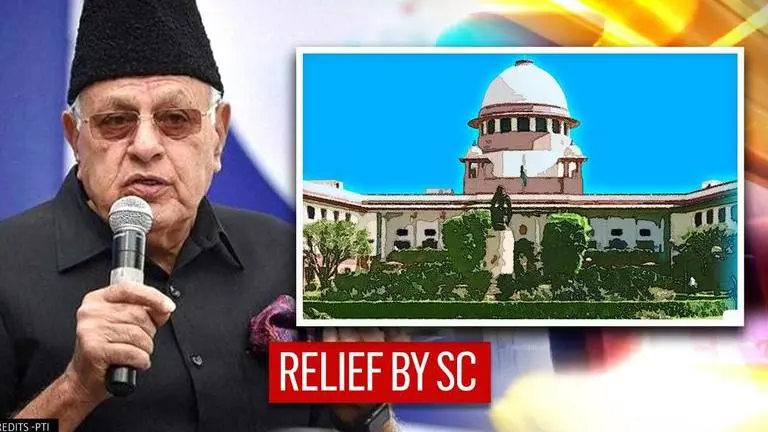Updated 3 March 2021 at 17:47 IST
'Not seditious': Supreme Court rejects plea against Farooq Abdullah over pro-China remarks
In a key development on Wednesday, the Supreme Court rejected a plea seeking action against NC president Farooq Abdullah for his alleged pro-China remarks.
- India News
- 3 min read

In a key development on Wednesday, the Supreme Court rejected a plea seeking action against NC president Farooq Abdullah for his alleged pro-China remarks. Alleging that the former Jammu and Kashmir CM was trying to "hand over" Kashmir to China, petitioners Rajat Sharma and Dr. Neh Srivastava sought Abdullah's prosecution for sedition under Section 124A of the Indian Penal Code. While dismissing the case, a division bench of the SC comprising Justices Sanjay Kishan Kaul and Hemant Gupta said, "It is not seditious to have views different from the government". Moreover, it imposed a fine of Rs.50,000 on the petitioners for making such claims.
Abdullah's remarks spark controversy
In an interview, Farooq Abdullah claimed that China had never accepted the nullification of Article 370. As per BJP national spokesperson Sambit Patra, the former J&K CM tried to justify China's aggression along the Line of Actual Control by citing the constitutional changes in the region. Moreover, he quoted Abdullah as saying, "We will bring back Article 370 with the help of China". He lamented that the former Chief Minister and sitting parliamentarian had made such a "seditious statement".
"In the interview, there are two aspects. He stated that since the Indian Parliament abrogated Article 370, it has disturbed China and that's why China is justified for the kind of aggression that it has taken on. In a way, Farooq Abdullah justifies China's expansionist mindset. Going even further, he made an anti-national statement. He said that we will bring back Article 370 with the help of China," BJP national spokesperson Sambit Patra remarked on October 12, 2020.
The political situation in J&K
In August 2019, a presidential notification along with the passage of requisite legislation in both Houses of Parliament resulted in Article 370 becoming virtually redundant. Furthermore, the state was bifurcated into the Union Territory of J&K and the Union Territory of Ladakh. Subsequently, several restrictions on the movement of people, communication, and internet services were imposed in the region. Multiple leaders including former Chief Ministers Farooq and Omar Abdullah and PDP chief Mehbooba Mufti were detained.
Advertisement
While the Public Safety Act charges against the Abdullah father-son duo were withdrawn in March 2020, Mufti was shifted to her Gupkar Road residence in Srinagar which was designated as a subsidiary jail by the J&K administration. In April, her detention under the PSA was extended on May 5 and July 31. Though her daughter Iltija Mufti had moved the Supreme Court in February 2020 seeking the PDP chief's release, the matter was not listed for many months owing to the COVID-19 pandemic. Finally, Mufti was released on October 13, 2020, barely a few weeks after the apex court commenced hearing the habeas corpus case.
Meanwhile, restrictions were gradually removed in the Union Territory. Signaling normalcy in the region, the District Development Council polls - the first big election held after the revocation of J&K's special status was conducted in 8 phases between November 28 and December 19, 2020, with a voter turnout of 51.42 percent. Most importantly, the People's Alliance for Gupkar Declaration which is fighting for the restoration of Article 370 also participated in this election and emerged as the single-largest coalition with 110 seats. In another welcome development, 4G mobile internet services were restored in all districts of J&K on February 5, 2021.
Advertisement
Published By : Akhil Oka
Published On: 3 March 2021 at 17:47 IST
